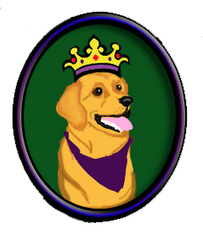Just what IS in my dog's food? Part 2: Carbohydrates
Labels:
carbs,
dog food,
grains,
ingredients
Carbohydrates are useful to dogs for readily burnable fuel for all kinds of muscular and metabolic activities. Cheap and easily produced sources of carbohydrates are such items as rice, corn, wheat, barley and soy. Hmmmmmmm... sounds like what some pet food manufacturers are commonly using as their first choice for a diet’s foundation.
It is common knowledge and generally agreed upon by experts that dogs are meat eaters and have evolved through the ages primarily as meat eaters. Although now "domesticated", our pet dogs have not evolved rumens along their digestive tracts in order to ferment cellulose and other plant material, nor have their pancreases evolved a way to secrete cellulase to split the cellulose into glucose molecules, nor have dogs become efficient at digesting and assimilating and utilizing plant material as a source of high quality protein. Herbivores do those sorts of things. That’s how Nature is set up at this time.On the other hand, some plant material such as rice, soybean meal and corn have some, although limited, usefulness in the meat eater's diet. Corn, wheat, soy, rice and barley are not bad or harmful to dogs. These plant sources are simply not good choices (we do get to choose what we feed our pets, don't we?) for the foundation of a diet to optimally nourish animals what are, have been, and for the foreseeable future will be meat eaters.
Cereal grains are the primary ingredients in most commercial pet foods. Many people select one pet food and feed it to their dogs for a prolonged period of time. Therefore, companion dogs eat a primarily carbohydrate diet with little variety. Today, the diet of dogs is a far cry from the primarily protein diets with a lot of variety that their ancestors ate. The problems associated with a commercial diet are seen every day at veterinary establishments. Chronic digestive problems, such as chronic vomiting, diarrhea, and inflammatory bowel disease are among the most frequent illnesses treated. These are often the result of an allergy or intolerance to pet food ingredients.
Let's pick on corn, for example.... it's cheap, takes up lots of room in the bag of food and in the pet's stomach so it will "fill ‘em up", it's a good carbohydrate source so the pet will have some energy, it has a few amino acids in it so the corn will contribute to the protein totals on the guaranteed analysis list, and there's a cheap and steady supply of corn. So the pet food manufacturer makes a corn diet, adds some "meat and bone meal" (which has been cooked at least twice before it gets in the bag and may contain too much calcium) to "complete the amino acid profile" and adds a few other calculated substances so that COMPLETE AND BALANCED can be stamped prominently on the pet food label.
What to look for:
►Whole ground grains such as rice, oats, barley, millet etc., potatoes, sweet potatoes, peas.
►Corn often gets a bad reputation. While it is NOT acceptable as a main source of protein in a dog food (as it is used in combination with corn gluten), as a source of carbohydrates it is no better and no worse than other grains in terms of nutritional value and digestibility. The starch part of corn is highly digestible but the whole ground product has a higher fiber content than other grains (around 7%). It should NOT, however, be listed as two or more of the top 5 ingredients!
What to avoid:
►Fragments like potato product, middlings/mids or mill run of any kind
►Unspecified grain sources like cereal food fines, (distiller's) grain fermentation solubles
►Any sort of grain hull (peanut hulls, rice hulls, soybean hulls, etc.) These have no nutrional value whatsoever and only add to the bulk of the food.
Dogs are livelier and healthier when meat, poultry, lamb and fish are the foundation of their diets. In other words, we should choose to feed them as the meat eaters they are and stop the senseless practice of feeding as if they were herbivores simply because it's cheaper to do so.
Next time we'll discuss the types of fats used in dog food.
Print Page














































No comments:
Post a Comment